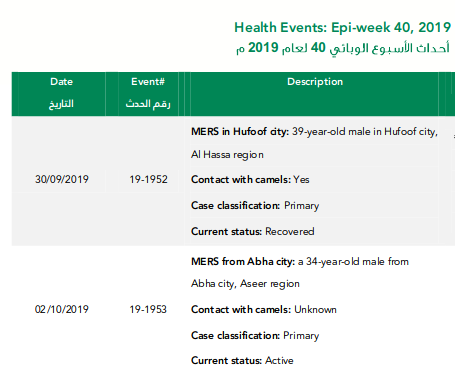#14,443
After a very quiet first half of September, last week the Saudi MOH reported 2 MERS Cases for Epi Week 39, and today, they are reporting their 2nd case for Epi Week 40 which began on Sunday.
We've not seen any significant clusters or hospital outbreaks since the spring, and most of the cases over the summer have been widely scattered and listed as `primary' with no known exposure.
Although this recent reduction in case reports is good news, over the past year we've seen a number of studies that have called into question public health's ability to identify mildly symptomatic, asymptomatic, or atypically presenting MERS infections in the community.
A few of those studies include:
J. Korean Med Sci: Atypical Presentation Of A MERS Case In A Returning Traveler From KuwaitAnd just over a year ago - in Evaluation of a Visual Triage for the Screening of MERS-CoV Patients - we looked at what has been described as a serious flaw in Saudi Arabia's MERS surveillance program.
mBio: High Prevalence of MERS-CoV Infection in Camel Workers in Saudi Arabia
AJIC:Intermittent Positive Testing For MERS-CoV
JIDC: Atypical Presentation Of MERS-CoV In A Lebanese Patient
While MERS continues to simmer in the Middle East, we've seen studies (see A Pandemic Risk Assessment Of MERS-CoV In Saudi Arabia) suggesting the virus may not have all that far to evolve before it could pose a genuine global threat.

